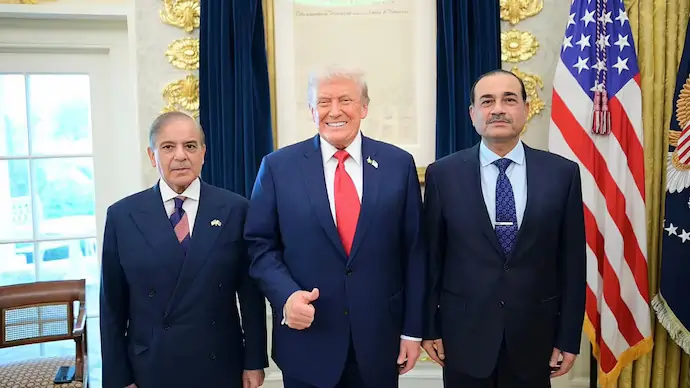In a significant development signalling a reset in US–Pakistan defence relations, Washington has included Islamabad in its latest arms contract for the supply of AIM-120 Advanced Medium-Range Air-to-Air Missiles (AMRAAMs). The announcement follows the recent meeting between US President Donald Trump, Pakistan’s Prime Minister Shehbaz Sharif, and Army Chief Field Marshal Asim Munir at the Oval Office.
The US Department of War (DoW) confirmed Pakistan’s inclusion in a modified contract awarded to Raytheon, the manufacturer of AMRAAMs. The update added USD 41.6 million to the ongoing production deal (FA8675-23-C-0037), taking the total contract value beyond USD 2.51 billion. The contract covers multiple countries, including the United Kingdom, Germany, Australia, Japan, Saudi Arabia, and now Pakistan, with completion expected by May 2030.
Although the number of missiles destined for Pakistan has not been disclosed, defence analysts believe the deal could involve the AIM-120C8 variant — the export version of the AIM-120D, currently the most advanced AMRAAM in US service. The inclusion indicates a potential upgrade of the Pakistan Air Force’s (PAF) F-16 fleet, which remains the only platform compatible with these missiles.
The PAF currently operates the older AIM-120C5 variant, about 500 of which were procured in 2010 alongside its F-16 Block 52 aircraft. The AMRAAMs were last in the spotlight during the 2019 Balakot crisis, when Pakistan used the missile to shoot down an Indian Air Force MiG-21 Bison flown by Wing Commander Abhinandan Varthaman.
The revival of US–Pakistan defence cooperation comes amid improving bilateral relations following the May 2025 India–Pakistan conflict. President Trump played a key diplomatic role in facilitating a ceasefire, a move for which Pakistan even proposed his nomination for the Nobel Peace Prize — a claim India later dismissed.
In recent months, Pakistan’s top military and diplomatic leadership, including PAF Chief Air Chief Marshal Zaheer Ahmed Babar, have held multiple high-level meetings in Washington, indicating a deliberate thaw in ties. The new missile deal is being seen as part of a strategic recalibration by the US towards South Asia, aimed at maintaining influence in the region amid growing Chinese–Pakistani defence cooperation.













